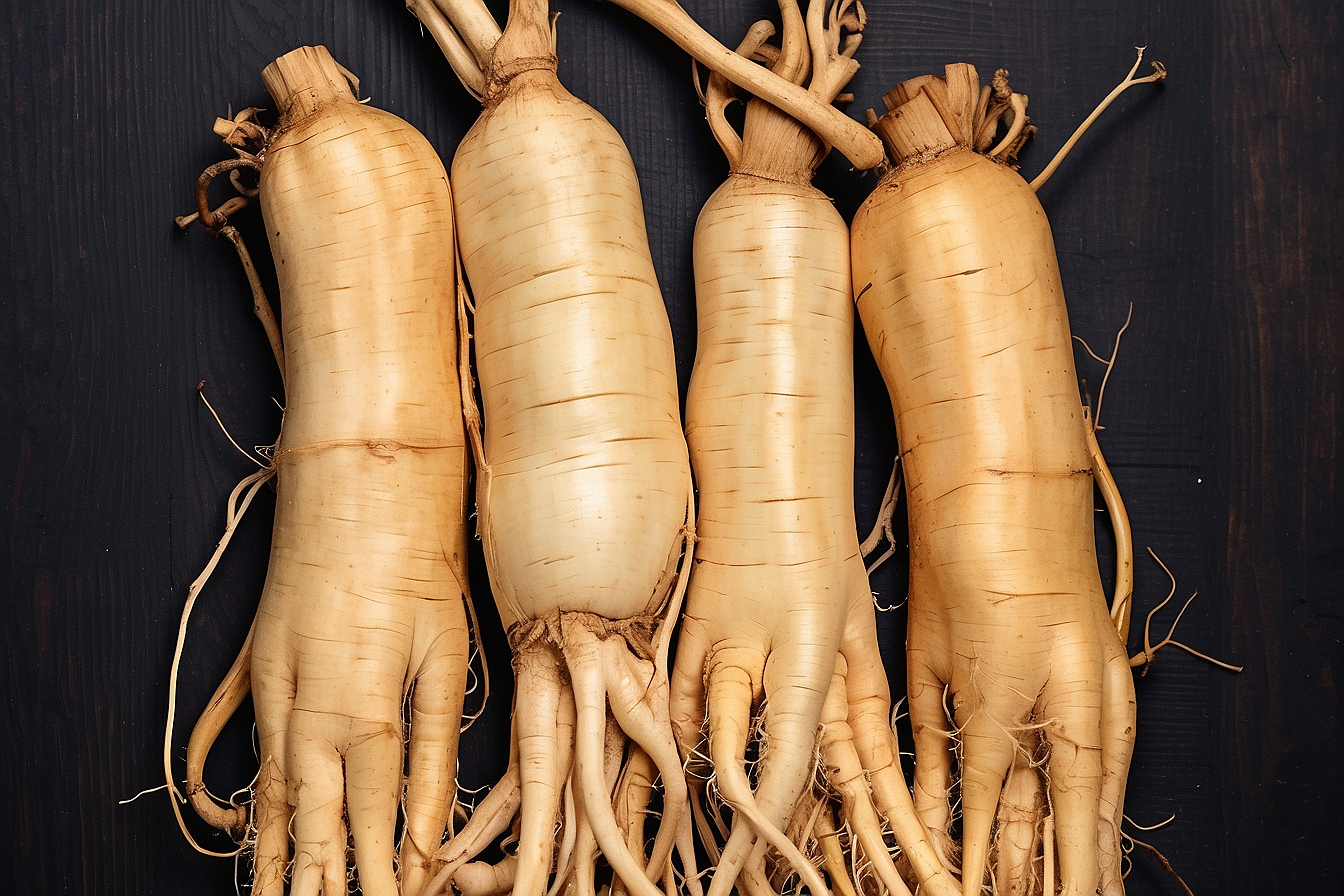In the world of herbal remedies, ginseng stands out as a venerable contender, celebrated across centuries and cultures for its remarkable properties. This amazing root has earned its place in traditional medicine, capturing the attention of modern science for its potential impact on energy, cognition, and stress resilience.
Discovering the Roots of Ginseng
Nestled in the shaded forests of Asia and North America, the roots of Panax ginseng have been treasured for centuries in traditional medicine. Known simply as ginseng, this resilient root has earned its place as a symbol of vitality and a natural source of well-being.
The Power of Ginsenosides
At the heart of ginseng’s potency lies its rich concentration of ginsenosides, bioactive compounds celebrated for their adaptogenic properties. These compounds contribute to ginseng’s ability to adapt to the body’s needs, offering a myriad of health benefits.
Health Benefits of Ginseng
- Adaptogenic Adaptation – Ginseng is revered for its adaptogenic nature, helping the body adapt to stress and restore balance. This adaptogenic quality may contribute to improved resilience against the effects of physical and mental stressors.
- Boosting Energy Levels – Known as a natural energy booster, ginseng may help combat fatigue and enhance physical and mental performance. Regular consumption is believed to promote sustained energy levels without the crashes associated with stimulants.
- Cognitive Clarity – Studies suggest that ginsenosides may have cognitive-enhancing effects, potentially improving memory, concentration, and overall cognitive function. Ginseng is often considered a natural ally for supporting brain health.
- Immune System Support – The immune-modulating properties of ginseng may contribute to a strengthened immune system. Regular consumption is thought to enhance the body’s defense mechanisms, reducing the risk of infections.
- Stress Reduction – Ginseng has been traditionally used to alleviate symptoms of stress and anxiety. Its adaptogenic nature may help regulate the body’s response to stressors, promoting a sense of calm and well-being.
Benefits on Hair and Skin
Ginseng is often praised for its potential benefits not only on internal health but also on external factors like hair and skin. Here’s how ginseng may contribute to the health and well-being of your hair and skin
Benefits for the Skin
- Antioxidant Protection – Ginseng is rich in antioxidants, which can help protect the skin from oxidative stress caused by free radicals. This, in turn, may contribute to anti-aging effects and overall skin health.
- Anti-Inflammatory Properties – The anti-inflammatory properties of ginseng may help soothe and calm irritated skin. It could be beneficial for conditions like acne, eczema, or psoriasis.
- Collagen Production – Some studies suggest that ginsenosides, the active compounds in ginseng, may stimulate collagen production. Collagen is crucial for maintaining skin elasticity and firmness.
- Brightening and Toning – Regular use of ginseng on the skin may contribute to a more even skin tone and complexion. It is often included in skincare formulations for its potential to brighten the skin.
- Moisturization – Ginseng has moisturizing properties that can help hydrate the skin. This can be especially beneficial for individuals with dry or dehydrated skin.
Benefits for the Hair
- Stimulating Hair Growth -Some studies suggest that ginsenosides may have a positive impact on hair follicles, potentially promoting hair growth and preventing hair loss.
- Reducing Hair Thinning – Ginseng may help prevent hair thinning by promoting blood circulation to the scalp. Improved blood flow can nourish hair follicles and encourage healthier hair growth.
- Managing Dandruff – The anti-inflammatory and antibacterial properties of ginseng may be beneficial for individuals dealing with dandruff or scalp conditions.
- Strengthening Hair Strands – Ginseng is believed to strengthen hair strands, making them less prone to breakage. This can contribute to overall hair health and resilience.
Application Ideas
- Skincare Products – Look for skincare products containing ginseng extract or ginseng-infused formulations, such as creams, serums, or masks.
- Haircare Products – Incorporate ginseng-infused shampoos, conditioners, or hair masks into your haircare routine.
- DIY Masks – Create DIY face or hair masks using ginseng powder or extract combined with other natural ingredients based on your skin or hair needs.
- Topical Application – Ginseng oil or extracts can be applied topically to the skin or hair. Ensure that the concentration is suitable for direct application.
CAUTION: As with any natural remedy, it’s advisable to do a patch test before applying ginseng products to a larger area to check for any allergic reactions. If you have specific skin or hair concerns, consulting with a dermatologist or healthcare professional is recommended.
Scientific Insights into Ginseng
- Ginseng and Mental Performance – Research indicates that ginseng may have a positive impact on cognitive function, with potential benefits for memory, attention, and overall mental performance.
- Energy Boosting Effects – Studies suggest that ginseng’s energy-boosting effects may be attributed to its ability to enhance cellular energy production and utilization, providing a natural and sustained source of vitality.
- Ginseng and Stress Reduction – Scientific investigations propose that ginseng’s adaptogenic properties may influence the body’s stress response mechanisms, leading to reduced stress levels and improved well-being.
Incorporating Ginseng into Your Routine
- Ginseng Tea – Enjoy the earthy flavor of ginseng by brewing it into a warm, invigorating tea. This is a soothing way to embrace its benefits.
- Ginseng Supplements – Consider adding ginseng supplements to your routine for a convenient and standardized dose of ginsenosides.
- Culinary Creations – Infuse ginseng into your culinary creations. Its subtle, slightly bitter taste complements soups, stews, and even desserts.
- Ginseng Tinctures – Explore the world of ginseng tinctures for a concentrated form that can be easily added to beverages or consumed directly.
What about Red Ginseng?
Red ginseng, also known as Korean red ginseng or Panax ginseng C.A. Meyer, is a form of ginseng that has been steamed and then dried, which gives it its distinctive reddish-brown color. This process is believed to enhance the bioactive compounds and potential health benefits of ginseng.
Key characteristics and points about Red Ginseng
- Processing Method – Red ginseng is created through a traditional processing method. Fresh ginseng roots are steamed at high temperatures before being dried. This steaming process is what gives the ginseng root its reddish hue.
- Enhanced Bioactive Compounds – The steaming and drying process is thought to alter the chemical composition of ginseng, particularly increasing the concentration of certain bioactive compounds known as ginsenosides. These compounds are believed to contribute to the adaptogenic and health-promoting properties of ginseng.
- Potential Health Benefits -Red ginseng is often associated with various health benefits, similar to white ginseng. These benefits may include enhanced energy levels, improved cognitive function, stress reduction, and immune system support. The specific effects can vary from person to person.
- Adaptogenic Properties – Like white ginseng, red ginseng is considered an adaptogen, which means it may help the body adapt to stress and promote overall well-being.
- Traditional Use -Red ginseng has a long history of use in traditional Asian medicine, especially in Korean and Chinese herbal traditions. It has been valued for its potential to boost vitality, support the immune system, and improve stamina.
- Forms of Consumption – Red ginseng is available in various forms, including capsules, powders, extracts, and teas. The choice of form often depends on personal preference and the intended use.
- Cautions and Considerations – While red ginseng is generally considered safe for many people, it’s essential to be mindful of individual reactions and potential interactions with medications. Consulting with a healthcare professional before incorporating red ginseng into your routine is advisable, especially if you have pre-existing health conditions or are taking medications.
Red Ginseng and Libido Support
- Improved Blood Circulation – Ginseng is believed to have vasodilatory effects, meaning it may help widen blood vessels and improve blood circulation throughout the body. This includes blood flow to the genital area, which is essential for arousal and sexual function.
- Stress Reduction – As an adaptogen, ginseng is thought to help the body adapt to stress and promote overall well-being. Stress can significantly impact libido, and by reducing stress levels, ginseng may indirectly contribute to improved sexual function.
- Energy Boost – Ginseng is known for its potential to boost energy and reduce fatigue. Increased energy levels can positively influence overall vitality and may enhance sexual performance and desire.
- Hormonal Balance – Some studies suggest that ginsenosides, the active compounds in ginseng, may have an impact on hormonal balance. This can be particularly relevant for individuals experiencing hormonal changes that might affect libido.
- Antioxidant Properties – The antioxidant properties of ginseng may help protect cells from oxidative stress. This can be important for maintaining overall health, including the health of reproductive organs.
- Enhanced Mood and Well-Being – Ginseng is believed to have mood-enhancing effects. By promoting a positive mood and overall well-being, ginseng may indirectly influence sexual desire and satisfaction.
It’s important to note that the term “red ginseng” specifically refers to the processed form of the ginseng root, and it is distinct from other types of ginseng, such as American ginseng (Panax quinquefolius) or Siberian ginseng (Eleutherococcus senticosus).
Additional Reading/References


Leave a Reply